Volkswagen:The Emissions Scandal
The Company Warned Over Test Cheating Years Ago
A Volkswagen engineer warned the company about cheating over its emission tests as early as 2011, a German newspaper reports.
Frankfurter Allgemeine Sonntagszeitung says the warning emerged during VWs current investigation into the scandal.
Separately, Bild am Sonntag said the internal inquiry had found that parts supplier Bosch had warned Volkswagen not to use its software illegally.
In September, VW apologised for cheating on emissions tests in the US. Some 11 million VW diesel cars built since 2008 are affected by the scandal.
They had devices which could detect when the engine was being tested and could change the cars performance to improve results.
Citing unidentified sources, Bild said Bosch had warned Volkswagen as early as 2007 that its software should only be used in company tests and not for normal driving.
In September, VWs chief executive Martin Winterkorn was forced out over the scandal and replaced by Matthias Mueller, the former head of Porsche.
As well as shocking VW customers, the scandal has stunned investors in the car maker.
The media has learned that debt products issued by Volkswagen are under review by the European Central Bank (ECB).
The ECB has been buying debt products from big companies, including VW, as part of its scheme to boost the eurozone economy.
But following the admission by the carmaker that it cheated emissions tests, the ECB is reviewing its purchase of debt from VW.
In particular, it is examining debt backed by loans to buyers of VW cars.
The products, known as assetbacked securities, have been popular investments as they offer a relatively high rate of return in an era when interest rates are low.
Such debt is also very important to car makers and allows them to finance loans to customers.
The indication of concern by the ECB will be a worry for other investors in that debt and could affect VWs ability to raise money.
Countries Investigating Emissions-rigging Scandal
United States: Scandal emerged following findings by the Environmental Protection Agency. Justice Department and New York regulators have launched criminal investigations
Germany: Transport Ministry to send fact-finding committee to Volkswagen
United Kingdom: Vehicle Certification Agency to re-run lab tests and compare with “real-world” driving emissions
Switzerland: Task force set up to investigate
Italy: Spot checks to be carried out on at least 1,000 diesel vehicles, trans-port minister says
France: Random checks on 100 diesel cars aimed at “ensuring the absence of fraud”, says Environment Minister Segolene Royal
South Korea: Environment Ministry to investigate 4-5,000 Jetta, Golf and Audi A3 vehicles, could extend to all German diesel cars if problems found
Canada: Environmental Agency investigating some 100,000 Volkswagen and Audi diesel cars
Norway and India opening fraud investigations
Switzerland temporarily banned the sale of Volkswagen (VW) diesel-engine models which could have devices capable of tricking emission tests.
It said the move could affect 180,000 cars - not yet sold or registered- in the Euro5 emission category.
The Swiss authorities have also set up a taskforce to fully investigate the issue.
A spokesman for the British department for transport said there were no plans for a similar ban in the UK.
The US Department of Justice(DoJ) said that it would join the US Environmental Protection.
The EPAs findings of the scandal cover 482,000 cars in the US only, including the VW-manufactured Audi A3, and the VW brands Jetta, Beetle, Golf and Passat.
But VW has admitted that about 11 million cars worldwide are fitted with the so-called “defeat device” - 2.8 million of them in Germany - and further costly recalls and refits are possible.
Half of the companys sales in Europe - VWs biggest market - are for diesel cars.
VW shares plunged around 30% in the days after the scandal broke.
Volkswagen: A Brief History
Germanys Volkswagen is the largest car maker in the world, after Toyota. Its 590,000 employees produce nearly 41,000 vehicles daily.
It currently owns 12 subsidiaries including Volkswagen Passenger Cars, Audi, Seat, Skoda, luxury brands such as Bentley, Bugatti, Lamborghini, Porsche and Ducati - as well as Volkswagen Commercial Vehicles, Scania and Man.
It is a long way from its origins as part of Nazi leader Adolf Hitlers vision to enable German families to own their first car - and it also owes a great deal of thanks to the initiative of a British army major, Ivan Hirst, who saved it from being dismantled and sold off after World War Two.
Here are some of the key points in Volkswagens 78-year history.
1937: The company is set up by the Nazi trades union organisation, the Deutsche Arbeitsfront. Very few Germans owned cars at the time, and the aim was create a “peoples car”. Hitler decrees the car should carry two adults and three children at 100km/h (60mph) and that it should be cheap, costing no more than a motorbike to buy.
Largely designed by Ferdinand Porsche, the KdF-Wagen (Kraft durch Freude, or “strength through joy”) has an air-cooled rear engine, torsion bar suspension, and an aerodynamic“beetle” shape that is important given its small engine.
1938: The company, initially called the Gesellschaft zur Vorbereitung des Deutschen Volkswagens mbH, is re- named Volkswagenwerk GmbH.
1938: A factory is built for the company in the new town of KdF-Stadt, modern-day Wolfsburg.
Some 336,000 people subscribe to buy the car via a monthly savings plan but by the outbreak of war only a handful of cars are complete and none are delivered to customers.
1939-45: During World War Two civilian car production ceases and the firm switches to making vehicles for the German army, using more than 15,000 slave labourers from nearby concentration camps. It is a practice that is widespread among German firms during the war. In 1998, survivors file a lawsuit against VW, which sets up a restitution fund.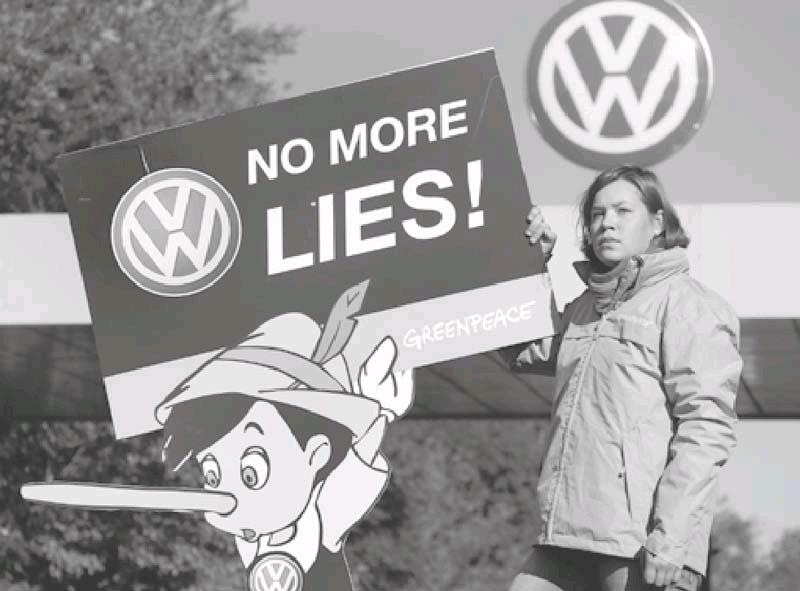
VW could Face Long Legal Nightmare
One German newspaper has described Volkswagens rigging of emission tests as the “most expensive act of stupidity in the history of the car industry”.
To that might be added that VW could now be entering one of the longest legal nightmares in corporate history.
The legal fallout from the scandal is potentially so vast and its tentacles so international and numerous that it lends credence to the joke: “These days there are two types of lawyer. Those instructed by Volkswagen and those about to be instructed by Volkswagen.”
Thus far, at least 10 government authorities around the world have opened investigations into VW. That number could grow.
On 18 September, the Environmental Protection Agency (EPA) in the US announced that VW had violated the Clean Air Act by unlawfully installing software into diesel cars between 2009 and 2015 that allowed the cars to cheat emissions tests. That meant they were emitting toxic gases up to 40 times above permitted levels.
VW admitted that 11 million cars worldwide were fitted with the software. It is now being investigated in the US, South Korea, France, Italy, Canada, Germany and the UK. Australia says it is monitoring the situation.
So, lets start with the possible criminal liability of the company and its staff in the US. The admission of corporate dishonesty by VWs American CEO Michael Horn makes some kind of criminal liability there look likely.
The US Department of Justice(DoJ) and New York regulators have opened criminal probes, others could follow. And there simply couldnt be a worse time to be a VW executive on the receiving end of such investigations.
On 9 September 2015, the Department of Justice issued a new policy memorandum, signed by Deputy Attorney General Sally Yates, covering the prosecution of individuals in corporate fraud cases. Entitled “Individual Accountability for Corporate Wrongdoing” it is more commonly known as “the Yates Memorandum”.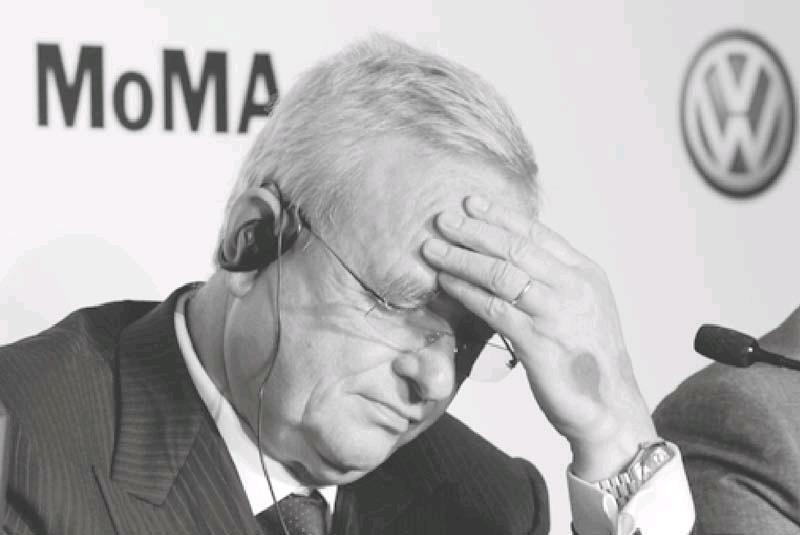
It places a much stronger focus on the investigation and prosecution of corporate executives than ever before. Previously there was a sense that if companies “fessed up” and co-operated with investigators, key individuals would be spared. Not now.
The memo makes clear that: “To qualify for any co-operation credit whatsoever, in both criminal and civil cases, corporations under investigation must provide DoJ with all relevant facts about the individuals involved in corporate misconduct.”
Michael OKane, a partner at the law firm Peters & Peters says: “Investigators are now bound to go after key individuals from the start.
“They must follow the evidence in emails, documents, minutes of meetings etc, to find out who knew or connived in the rigging in order to find the most culpable and senior individuals.”
Bad news for any individuals at VW involved in the rigging. But bad news also for the company. The US is a country that takes white collar and environmental crime very seriously.
VW has Said 11 Million Cars are Affected
The EPA, which is still investigating VW, could levy fines of up to $18bn(£11.8bn).
The DoJs Environmental Division can prosecute civil and criminal charges against individuals and companies, as can state prosecutors.
It is also worth noting that it is much easier to prosecute a company in the US than in the UK.
In the US any criminal act by an employee criminalises the company. In the UK the act has to be at board level or equivalent because the prosecution has to prove the crime was committed by a “controlling mind” of the company.
It is important not to rush to guilt. VW may have defences to criminal charges if the software in the cars was installed for a legitimate purpose.
Prosecutors would need to prove an intention to rig the tests. That does not apply in civil cases.
The rigged vehicles engines actu- ally emitted nitrogen oxide pollutants up to 40 times above what is allowed in the US.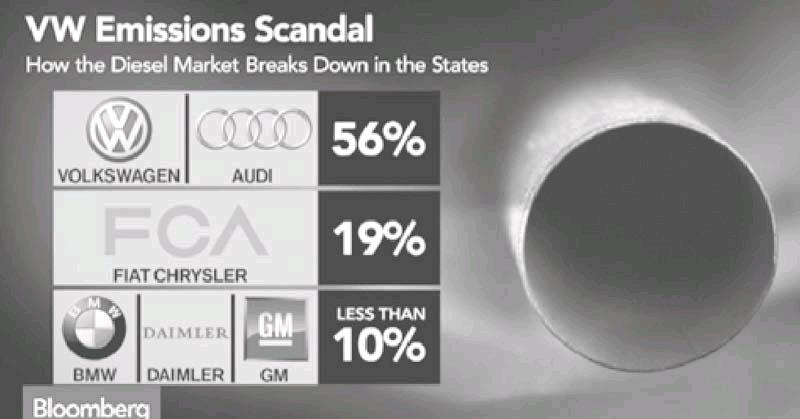
VW isnt the only car manufacturer to face a US criminal investigation.
Last year, Toyota agreed to pay$1.2bn to settle a claim that it concealed a technical problem with brakes, accelerator pedals and floor mats in its cars which caused some vehicles to accelerate suddenly.
In September, General Motors agreed to pay $900m for concealing an ignition-switch defect.
Both GM and Toyota entered what are known as “deferred-prosecution agreements” that give them time to put their house in order and can mean that criminal charges are dropped at a later date - a kind of corporate probation period.
That might seem an attractive option for VW, but prosecutions for environmental crimes by the DOJ have required companies to either plead guilty or take their chances at a trial.
But if the “rigging” was planned abroad, could the US get hold of any VW executive or employee based in Germany?
The challenge for the US is that the German constitution prohibits any German national from being extradited outside the EU.
What the US has done in other cases to get their man is issue an Interpol Red Notice, preventing the suspect leaving Germany. This tends to result in the executive agreeing a plea deal in the US, in exchange for the Red Notice being lifted.
It is worth noting that if an offence was committed under UK law and UK prosecutors seek the extradition of VW executives, the extradition issue is not a problem as Germany has to extradite its nationals within the EU under the European Arrest Warrant scheme.
Class Actions
In addition to possible prosecutions of the company and its staff by state authorities, there is the not small matter of civil claims brought by individuals or groups.
These consist of customers suing for breach of contract because VW misrepresented the emission levels of the vehicles. Group actions are inevitable here and are likely to take place in all of the countries where “rigged” cars were sold.
Volkswagen faces a long road ahead to rebuild its reputation.
There are already reports of class actions being filed in a number of US states and in Canada.
Bob Clifford, a partner at Clifford Law Offices in Chicago and a lead lawyer in the 9/11 litigation, filed a class action on behalf of VW customers in September.
“Actions will be filed in district courts around the country,” he says.“These will be consolidated in a ‘multidistrict litigation, resulting in one very large overall claim to be heard in front of a single federal judge.”
VW dealerships could also bring group actions for breach of contract if they were misled and the companys shareholders could sue following the loss in value of their shares.
There could in addition be actions taken by groups of asthma sufferers affected by the increased emissions or by environmental groups seeking to hold VW to account.
Bearing in mind the admissions already made by the company, “no win, no fee” lawyers will be amassing in large numbers on the outskirts of courts.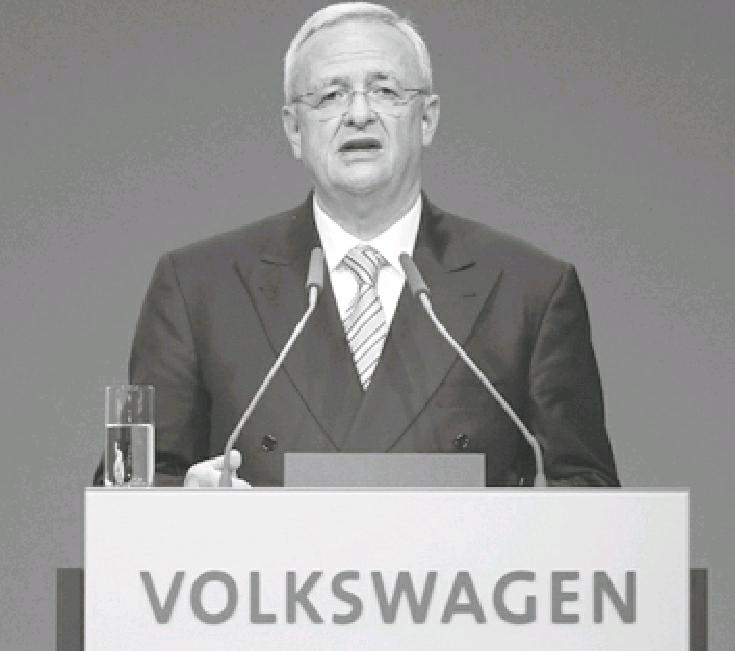
Expect a rash of those annoying unsolicited phone calls and texts. After all, potentially 11 million people have to be contacted.
Even heavily polluted clouds have sliver linings... if you are a lawyer. This one looks like solid gold.
And if other car manufacturers are involved in the scandal, you can upgrade that lining to platinum.
Volkswagen to Refit Cars Affected by Emissions Scandal
Volkswagen said in September it will repair up to 11 million vehicles and overhaul its namesake brand following the scandal over its rigging of emissions tests.
New Chief Executive Matthias Mueller said the German carmaker would tell customers in the coming days they would need to have diesel vehicles with illegal software refitted, a move which some analysts have said could cost more than $6.5 billion.
In Washington, U.S. lawmakers asked the automaker to turn over documents related to the scandal, including records concerning the development of a software program intended to defeat regulatory emissions tests.
In separate letters, leading Repub- licans and Democrats on the House Energy and Commerce Committee requested information from both Volkswagen and the U.S. Environmental Protection Agency as part of an investigation into the controversy.
Europes biggest carmaker has admitted cheating in diesel emissions tests in the United States and Germanys transport minister says it also manipulated them in Europe, where Volkswagen sells about 40 percent of its vehicles.
The company is under huge pressure to address a crisis that has wiped more than a third off its market value, sent shock waves through the global car market and could harm Germanys economy.
“We are facing a long trudge and a lot of hard work,” Mueller told a closed-door gathering of about 1,000 top managers at Volkswagens Wolfsburg headquarters.
“We will only be able to make progress in steps and there will be setbacks,”he said, according to a text seen by Reuters.
Volkswagen did not say how the planned refit would make cars with the“cheat” software comply with regulations, or how this might affect vehiclesmileage or efficiency, which are important considerations for customers. It said it would submit the details to Germanys KBA watchdog next month.
Manipulating emissions results allowed Volkswagen to keep down engine costs in a “clean diesel” strategy that was popular in Europe and at the heart of a drive to improve U.S. results.
Mueller was appointed CEO on Friday to replace Martin Winterkorn. German prosecutors said they were investigating Winterkorn over allegations of fraud.
An Embarrassment for Germany
The crisis is an embarrassment for Germany, which has for years held up Volkswagen as a model of its engineering prowess and has lobbied against some tighter regulations on automakers. The German car industry employs more than 750,000 people and is a major source of export income.
Economy Minister Sigmar Gabriel told reporters he was not worried about damage to the economy from Volkswagens problems, “at least, not if we deal with it sensibly.”
There must be no “soft pedalling, no obfuscation and no covering-up” by Volkswagen, he added.
A survey of 62 institutions by investment banking advisory firm Evercore ISI found around two-thirds said it would not be possible to invest in Volkswagen over the next six months if costs, fines, legal and criminal proceedings were outstanding or inadequately quantified.
VWs brand image has also slumped this month, market researchers YouGov said, citing a survey of about 2,000 consumers.
Volkswagen said previously about 11 million vehicles were fitted with software capable of cheating emissions tests, including 5 million at its VW brand, 2.1 million at luxury brand Audi, 1.2 million at Skoda and 1.8 million light commercial vehicles.
Refitting 11 million cars would be among the biggest recalls in history by a single automaker, similar in scale to Toyota Motor Corps 2009-2010 recall of more than 10 million vehicles over acceleration problems, though dwarfed by the number recalled by multiple carmakers due to faulty Takata Corp air bags.
Volkswagen sold 10.1 million vehicles in the whole of 2014.
The company said it would set aside 6.5 billion euros ($7.3 billion) to help cover the cost of the crisis.
But analysts think that may not be enough, as it faces potential fines from regulators and prosecutors, as well as lawsuits from cheated customers.
Spains industry ministry said Volkswagens local business had agreed to return fuel-efficiency subsidies on vehicles that had broken rules. It said Spain, which offered subsidies of 1,000 euros for energy-efficient car purchases, would ask for the money back from the car manufacturer and not consumers.
Volkswagens core VW division, struggling with high-fixed costs and low profit margins, would be given more autonomy, akin to the independence enjoyed by premium flagship brands Audi and Porsche.
Analysts have long urged the company to tackle underperformance at its core mass-market brand, and to dilute control from the center which has been blamed for product delays and problems adapting to local markets.
A source familiar with the matter also said the executive committee of Volkswagens supervisory board would meet to discuss progress with the companys investigations and engaging U.S. law firm Jones Day to lead an external probe.
Klaus Mohrs, mayor of Wolfsburg where Volkswagen employs around 70,000 people, said he expected a sharp decline in business taxes due to the crisis, and announced an immediate budget freeze and hiring ban.
The emissions scandal has sent ripples through the global car market too, with manufacturers fearing more costly regulations and a drop in diesel car sales.
The European Commission is working on plans to reform the European system for approving new models of cars by the end of the year.
EU Bank Chief ‘could Recall VW Loans
The European Investment Bank(EIB) could recall loans it gave to Volkswagen, its president told a German newspaper.
Werner Hoyer told Sueddeutsche Zeitung that the EIB gave loans to the German carmaker for things like the development of low emissions engines.
He said they could be recalled in the wake of VWs emissions cheating.
The paper reported that about€1.8bn (£1.3bn) of those loans are still outstanding.
Mr Hoyer is quoted as saying that the EIB had granted loans worth around €4.6bn to Volkswagen since 1990.
“The EIB could have taken a hit[from the emissions scandal] because we have to fulfil certain climate targets with our loans,” the Sueddeutsche Zeitung quoted Mr Hoyer as saying.
Mr Hoyer was attending the International Monetary Funds meeting in Lima, Peru.
He added that the EIB would conduct “very thorough investigations” into what VW used the funds for.
Mr Hoyer told reporters that if he found that the loans were used for purposes other than intended, the EU bank would have to “ask ourselves whether we have to demand loans back”.
He also said he was “very disappointed” by Volkswagen, adding the EIBs relationship with the carmaker would be damaged by the scandal.
Volkswagen admitted that about 11 million of its vehicles had been fitted with a “defeat device” - a piece of software that duped tests into showing that VW engines emitted fewer emissions than they really did.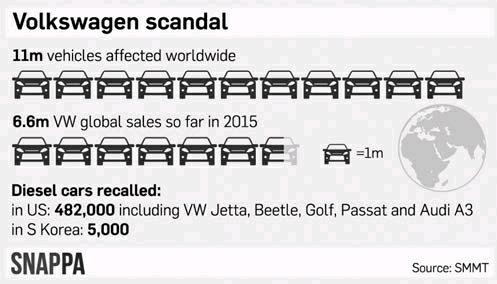
Mr Hoyers comments come days after VWs US chief Michael Horn faced a Congress panel to answer questions about the scandal, which has prompted several countries to launch their own investigations into the carmaker.
VW Recalls Diesel Vehicles in China
Volkswagen is recalling 1,950 diesel vehicles in China to correct engine software that the automaker has admitted cheats on emissions tests.
The recall applies to 1,946 Tiguan sport utility vehicles and four Passat B6 sedans, all of them imported, the company said. It said technical solutions are being developed and have yet to be submitted to Chinese authorities for approval.
Volkswagens business in China, the largest auto market by number of vehicles sold, has suffered little impact from the global emissions scandal due to the lack of popularity of diesel cars among Chinese drivers. But foreign companies are closely watched by Chinese authorities, and state media publicize suggestions of misconduct.
Europes biggest automaker has acknowledged it installed software dubbed“defeat devices” on diesel vehicles. They switch on pollution controls when cars undergo emissions tests, but switch off during driving to improve performance.
“Volkswagen would like to sincerely apologize for any inconvenience caused to our customers,” the company said in a statement. “We would like to assure that we will do everything humanly possible to win back trust and take care of any concerns.”
Diesel is widely used in trucks in the worlds second-largest economy, but powered just 0.3 percent of autos sold last year in China, or a few thousand units.
Volkswagen is, along with General Motors Co., one of the most popular vehicle brands in China, but is struggling with an unexpectedly sharp downturn in the market and fast-changing consumer tastes.
Auto sales in China declined in August for a third straight month, contracting by 3.4 percent from a year earlier.
VW blamed weakness in China for a 16 percent decline in its secondquarter global profit. First-half sales in China were off 0.5 percent.
The president of VW China, Jochem Heizmann, told reporters in April that the company lagged overall market growth because it lacked products in the budget SUV segment, where sales are surging.
In 2013, Volkswagen recalled 384,000 vehicles in China to fix gearboxes after state television publicized complaints about them.

